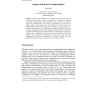Free Online Productivity Tools
i2Speak
i2Symbol
i2OCR
iTex2Img
iWeb2Print
iWeb2Shot
i2Type
iPdf2Split
iPdf2Merge
i2Bopomofo
i2Arabic
i2Style
i2Image
i2PDF
iLatex2Rtf
Sci2ools
BIRTHDAY
2005
Springer
2005
Springer
Agents with Exact Foreknowledge
Computational experiments are reported involving the concept of foreknowledge, an agent’s direct, unmediated and accurate, but possibly incomplete, awareness of its future including states and events involving the agent itself. Foreknowledge is used here as a conceptual tool with which to explore certain issues around time and rationality. We first explain how foreknowledge in this sense may be given to the agents in an agent society on a computer. The generation of a world history is viewed as a process of solving a constraint satisfaction problem. Then we seek to understand the circumstances in which foreknowledge may be either beneficial or detrimental to a society of rational agents. A special case is when agents have foreknowledge of their own “deaths”. An experimental interpretation of this special case has been implemented, and results are presented and discussed. Finally, the work reported is briefly discussed in the context of current theories of time.
Applied Computing | BIRTHDAY 2005 | Constraint Satisfaction Problem | Foreknowledge | Special Case |
Related Content
| Added | 26 Jun 2010 |
| Updated | 26 Jun 2010 |
| Type | Conference |
| Year | 2005 |
| Where | BIRTHDAY |
| Authors | Jim Doran |
Comments (0)

